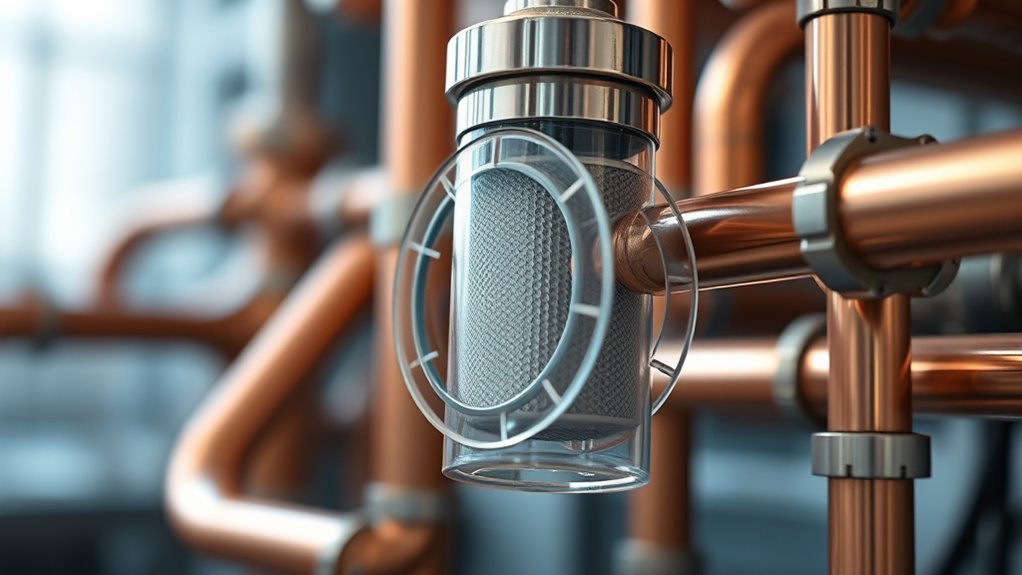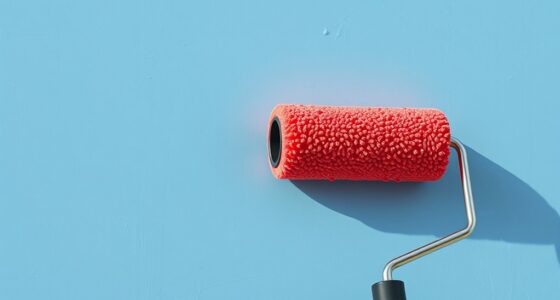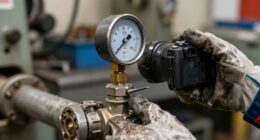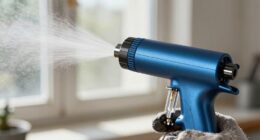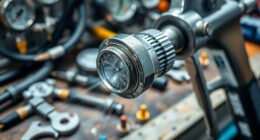Inline filters are essential for keeping your water clean and your system working smoothly. They remove dirt, rust, and other contaminants right where the water flows, protecting your appliances and piping. Proper maintenance guarantees they don’t clog or reduce water pressure, extending their lifespan and maintaining water quality. Regular inspection and timely replacements are key to effective filtration. Keep going to discover how to choose and maintain the best inline filters for your needs.
Key Takeaways
- Inline filters remove contaminants, ensuring water purity and protecting plumbing systems from damage.
- Regular maintenance prevents clogging, maintains water flow, and extends filter lifespan.
- High-quality filters improve purification efficiency and safeguard health by effectively removing impurities.
- Proper filter replacement and inspection maintain system performance and prevent costly repairs.
- Consistent filter upkeep ensures clean, safe water and enhances overall system energy efficiency.
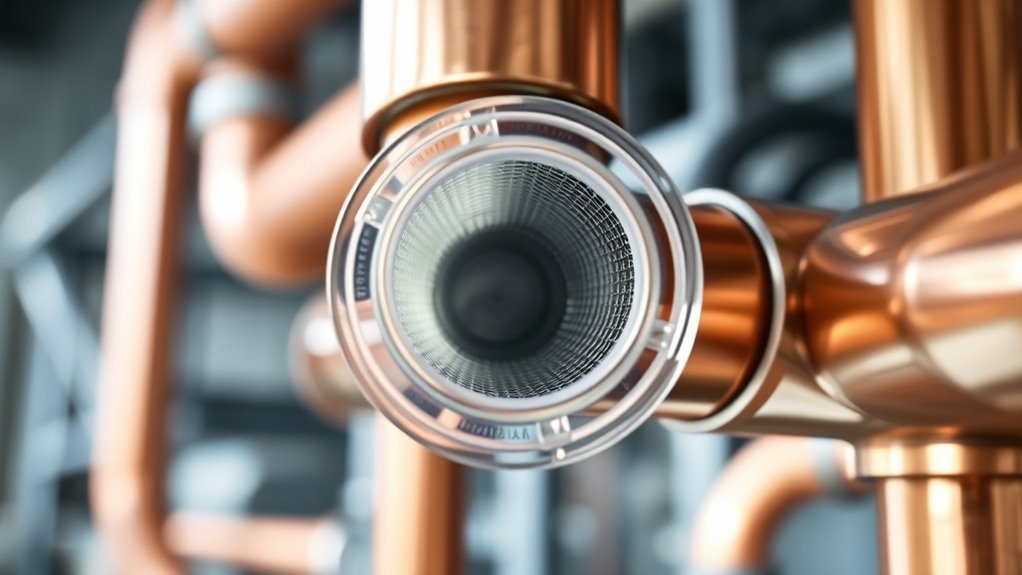
Inline filters play an essential role in maintaining the efficiency and longevity of your systems by removing contaminants before they cause damage. When you think about water purification, these filters act as the first line of defense, ensuring that the water flowing through your pipes remains clean and safe. Proper filter maintenance is fundamental to keep your inline filters functioning correctly and to prevent buildup that can hinder flow or reduce filtration effectiveness. Neglecting maintenance can lead to clogged filters, which not only decreases water pressure but also allows impurities to bypass filtration, risking system damage and compromised water quality.
Regular filter maintenance ensures optimal performance and protects your system from damage.
Regularly inspecting and replacing your inline filters is straightforward but indispensable. Over time, filters accumulate dirt, sediment, rust, and other contaminants, which can diminish their ability to purify water efficiently. When you perform filter maintenance, you extend the lifespan of your filtration system and maintain ideal water purification. This process involves checking for signs of clogging, discoloration, or reduced flow, then replacing the filter element as recommended by the manufacturer. Many filters are designed with user-friendly features that make replacement quick and simple, saving you time and effort. Staying on top of this routine prevents the buildup of harmful particles, ensuring your water remains clear, crisp, and safe for daily use.
In addition to maintaining the filters themselves, it’s essential to understand the importance of using high-quality replacement filters. Low-grade options may seem cost-effective initially but often require more frequent replacements and can fail to remove certain contaminants effectively. When you choose the right filters for your system, you improve your water purification process, making it more reliable. Proper filter maintenance not only safeguards your appliances but also promotes healthier living, especially if you rely on filtered water for drinking, cooking, or other household needs.
Moreover, keeping your inline filters clean and well-maintained contributes to energy efficiency. When filters are clogged, your system has to work harder to push water through, increasing energy consumption and wear on components. By staying diligent with filter maintenance, you minimize these issues, reduce utility bills, and extend the life of your entire water system. Regular filter maintenance is also crucial because water quality can vary based on local conditions and source water contaminants, making ongoing upkeep vital. Remember, water purification isn’t a set-it-and-forget-it task. Regular attention to your inline filters ensures you continue to enjoy safe, clean water without interruption. Ultimately, investing time in routine filter maintenance protects your system, improves water quality, and saves you money in the long run.
Frequently Asked Questions
What Materials Are Used to Manufacture Inline Filters?
You’ll find inline filters made from various manufacturing materials, including pleated paper, polyester, cellulose, and woven fabrics. The filtration media in these filters often consists of activated carbon, fiberglass, or synthetic fibers, which help trap contaminants effectively. These materials are chosen for their durability, chemical resistance, and filtration efficiency, ensuring your system stays clean and runs smoothly. By selecting the right manufacturing materials, you optimize filter performance and longevity.
How Often Should I Replace My Inline Filter?
You should replace your inline filter every 3 to 6 months, depending on your maintenance schedule and water quality. Regularly checking the filter’s condition helps guarantee peak performance and prolongs its lifespan. If you notice reduced flow or bad taste, it’s time for a replacement. Adhering to recommended maintenance schedules ensures your filter works efficiently, providing clean water and preventing buildup that could damage the system.
Can Inline Filters Remove Bacteria and Viruses?
Inline filters can remove bacteria and filter viruses, but their effectiveness varies. Some filters are designed for bacteria removal, trapping bacteria-sized particles, while others offer virus filtration, blocking smaller pathogens. You need to check your filter’s specifications to confirm it targets both bacteria and viruses. Regularly replacing filters maintains their ability to effectively protect you from harmful microorganisms, ensuring clean, safe water every time you use it.
Are Inline Filters Suitable for Both Residential and Industrial Use?
Yes, inline filters are suitable for both residential and industrial use. They work well regardless of water pressure levels, but you should check compatibility for your specific setup. Installation is generally straightforward, making it easy for you to add them without hassle. Whether for a home or a larger industrial system, inline filters efficiently improve water quality while maintaining good water pressure and easy installation.
What Are the Signs of a Clogged or Failing Inline Filter?
You might notice filter clogging if your water pressure drops unexpectedly or flow slows down considerably. Filter failure signs include visible debris or discoloration in the filtered water, strange odors, or frequent system malfunctions. It’s worth investigating if your inline filter shows these symptoms, as clogging and failure can compromise water quality and damage your system. Regular maintenance helps prevent these issues and keeps your water supply clean.
Conclusion
In the end, understanding inline filters and their importance is key to keeping your systems running smoothly. They act as the first line of defense, stopping dirt and debris before they cause real damage. Don’t wait until it’s too late—think of these filters as your system’s best friends. When you prioritize their maintenance, you’re not just avoiding trouble; you’re keeping everything in tip-top shape. After all, a stitch in time saves nine.
